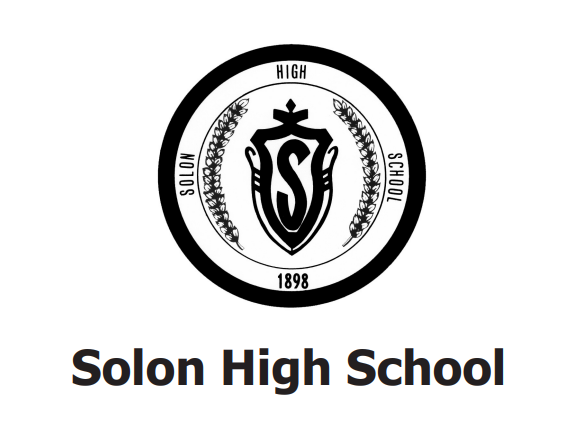New Courses In Solon High School (SHS) For The 2021-2022 School Year

Solon High School Logo on Program of Studies Courtesy of Hannah Levenson
December 14, 2020
It can be difficult to believe the first semester is almost over, given what high school students across the nation have dealt with this school year. In the beginning of the second semester, freshman, sophomores and juniors, will have to make decisions on what classes to take for the next school year. Solon High School (SHS) is offering three new courses for the 2021-2022 school year. These courses include Accounting II, AP Seminar: The African Diaspora and Multicultural Literature.
Accounting II
Accounting II is an elective course that is a semester long, hence worth ½ a credit. In order to take this class, students must complete Accounting I first, but it does not matter what grade level a student is in. Accounting is taught by Beth Mackens.
Accounting II will be continuing to build skills learned in Accounting I, but adding broader concepts such as larger scale businesses.
“We start to look at bigger businesses like corporations instead of little mom and pop shops,” Mackens said. “We look at what big corporations do with their money and how they use it.”
Mackens recommends the class for students who want to go into business, marketing, finance, international business and similar degrees. Mackens explained no matter which business route a student would take in college, Accounting will be a requirement for the degree. Taking Accounting I and II would give students a head start and better prepare them for Accounting in college.
AP Seminar: The African Diaspora
AP Seminar: The African Diaspora is a year long course, hence worth 1 credit. AP Seminar: The African Diaspora is taught by Kelly Fishman. You have to be a junior or senior to take this course. AP Seminar: The African Diaspora will allow you to take AP Research the next year if you choose so.
Fishman recommends the course to students who enjoy reading and writing, in addition to students who are interested in the diaspora of Africans, or relocation to places outside of Africa, through various methods, forced or chosen. The class also focuses on how African & Black culture spread and influenced countries all over the world, most notably pop culture.
“We start with slavery because the dispersion is what begins everything,” Fishman said. “We’ll look at like oppression and resistance, the resistance movement that have come with that [and] cultural connections. I think that it creates this really broad scope for people who are interested in the cultural aspects of Africa and how we’ve seen those play out throughout the world.”
AP Seminar: The African Diaspora follows similar guidelines to AP Seminar but with a focus more on the African Diaspora. This is the first year that the college board is offering this class and SHS will be among some of the first high schools to offer AP Seminar: The African Diaspora.
Multicultural Literature
Multicultural Literature is an English elective course that is a semester long, hence worth ½ a credit. There are no prerequisites for the class. Multicultural Literature is taught by Margaret Locke.
Multicultural Literature focuses on writing and literature from people of color, specifically American people of color. According to Locke, she hopes to broaden students’ perspectives of different cultures and that students will find a voice they can identify with and relate to, and, at a minimum, develop a sense of empathy.
“We will be looking at African American literature, Native American, Asian American and Latin American…within those, I am going to try to offer a wide variety of texts,” Locke said. “I think especially within different [regional] literature, that can mean so many things…the perspective of a Cuban person might be very different from a Mexican person or a Chinese [person] versus [a] Filipino [person]…” Locke said.
Locke added that the course would be desirable to a student who likes to read frequently, especially since you will be offered a choice of which books to read instead of Locke assigning the same book to everyone. Locke also recommends the course to students who are interested in racial issues that the United States is facing.
Picking classes can be difficult due to the quantitative supply of classes offered at SHS. However, knowing what your interests are can help one decide which classes to take. No one student’s path looks the same as another students. There is no wrong way to go as long as one has a balanced schedule, meets graduation requirements and takes classes they enjoy.
